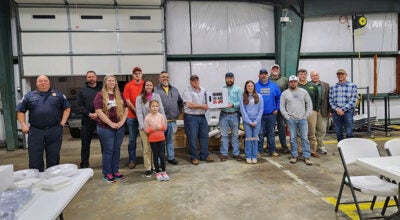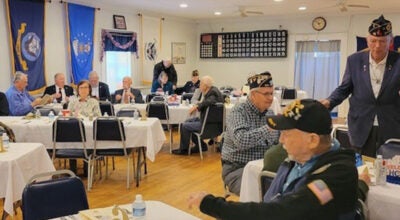CEC provides ‘live line’ safety training
Published 6:06 pm Friday, June 24, 2022

- Community Electric Cooperative lineworkers used the cooperative’s mobile, live line trailer to demonstrate, among other things, the intensity of the flames and smoke that a live power line can generate when it ignites trees.
|
Getting your Trinity Audio player ready...
|
Public safety in Western Tidewater got a boost when lineworkers from Windsor-based Community Electric Cooperative (CEC) gave a two-hour “live line” training session during the week of June 12 to more than 25 members of local firefighting crews.
A CEC press release continued by stating that the training session demonstrated the clear dangers posed by downed power lines and structure fires as well as the less-obvious — but still lethal — hazards that come with newer technologies like solar panel circuitry and battery energy storage systems, and with the rising use of standby power generators in homes and businesses.
Firefighters from the Carrsville Volunteer Fire Department, Franklin Fire and Rescue, the Hunterdale Volunteer Fire Department and the Windsor Volunteer Fire Department participated.
“Our goal in providing this training is the safety of first responders, which in turn means public safety,” CEC Manager of Operations Glen Presson said. “When first responders are out there trying to make an unsafe situation safe — whether it’s a structure fire, a car accident involving a downed power line, a storm or something else — we want them to be educated on how to keep themselves safe so they can assist the public.”
The training session was conducted at the Carrsville fire station. Its main elements included the following:
- a discussion of dangerous situations encountered by the first responders;
- the use of CEC’s mobile, live line trailer to demonstrate the intensity of the flames and smoke that a live power line can generate when it ignites trees;
- the use of the trailer to show how a live line can “fry” a hot dog and, by inference, a human body; and
- a demonstration of the severity of a blown fuse on an electric transformer, a component typically located on a utility pole to transfer energy between circuits.
CEC has conducted public safety training in various forms and settings for decades, but in recent years, it has “stepped up” a training regimen that historically focused on safety precautions around downed power lines and “pulling” meters to disconnect the flow of electricity into structures when fighting fires, Presson said. During the recent training, as was the case a year ago in a session conducted for the Suffolk Fire & Rescue Department, representatives of Community Electric’s RECORE subsidiary demonstrated the procedures for safely de-energizing structures with standby power generators like those that RECORE sells and leases. The equipment is capable of activating automatically when it senses power interruptions. CEC and RECORE team members also discussed safety procedures to address circuitry that “daisy chains” through solar panels now commonly installed in residences and businesses.
Last week’s session resulted from a conversation that Presson had with Devin Butler, a lieutenant with the Carrsville squad that receives about 350 calls for service each year.
“We want to maintain a safe area when accidents occur or trees are down with live wires,” Butler said. “Plus, they’re sharing suggestions with safety rules for alternative energy. We’re blessed to have Community Electric close to us to provide this service and increase our safety awareness.”
Butler is a 33-year veteran of the Carrsville department and said volunteers “truly have to have their hearts in it” to answer calls at all times of the day and night. Even experienced firefighters like himself benefit from the safety training, Butler said. He last participated in a similar session — which predated the widespread deployment of alternative energy technologies — about 15 years ago.
Despite resource constraints, the live line training is a public service that Community Electric is eager to provide more frequently given the emergence of new technologies and the turnover among first responders, Presson said.
“Time and resources are in short supply, but really and truly this is a service that all local first responders every three or four years need to go through,” Presson said. “Even emergency medical technicians, sheriffs and police officers could benefit from a program like this from time to time.”
Community Electric Cooperative was founded in 1938. It serves more than 11,000 accounts over its 1,590 miles of distribution line.




